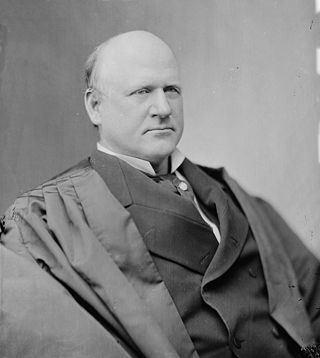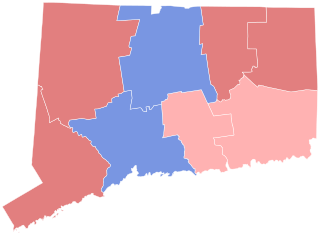
Presidential elections were held in the United States on November 3, 1908. Republican Party nominee William Howard Taft defeated threetime Democratic nominee William Jennings Bryan. Incumbent President Theodore Roosevelt honored his promise not to seek a third term, and persuaded his close friend, Taft, to become his successor. With Roosevelt's support, Taft won the presidential nomination at the 1908 Republican National Convention on the first ballot. The Democratic Party nominated Bryan, who had been defeated twice previously, in 1896 and 1900, by Republican William McKinley.

John Marshall Harlan was an American lawyer and politician who served as an associate justice of the Supreme Court of the United States from 1877 until his death in 1911. He is often called "The Great Dissenter" due to his many dissents in cases that restricted civil liberties, including the Civil Rights Cases, Plessy v. Ferguson, and Giles v. Harris. Many of Harlan's views expressed in his notable dissents would become the official view of the Supreme Court starting from the 1950s Warren Court and onward.

The Conservative Party of New York State is an American political party founded in 1962 following conservative dissatisfaction with the Republican Party in New York. Running on the Conservative Party line, James L. Buckley won election to the U.S. Senate in 1970 and served for one term. Since 2010, the party has held "Row C" on New York ballots—the third-place ballot position, directly below the Democratic and Republican parties—because it received the third-highest number of votes of any political party in the 2010, 2014, 2018, and 2022 New York gubernatorial elections. The party is known for its strategy of attempting to influence the Republican Party in a more conservative direction.

James Bennett McCreary was an American lawyer and politician from Kentucky. He represented the state in both houses of the U.S. Congress and served as its 27th and 37th governor. Shortly after graduating from law school, he was commissioned as the only major in the 11th Kentucky Cavalry, serving under Confederate Brigadier General John Hunt Morgan during the American Civil War. He returned to his legal practice after the war. In 1869, he was elected to the Kentucky House of Representatives where he served until 1875; he was twice chosen Speaker of the House. At their 1875 nominating convention, state Democrats chose McCreary as their nominee for governor, and he won an easy victory over Republican John Marshall Harlan. With the state still feeling the effects of the Panic of 1873, most of McCreary's actions as governor were aimed at easing the plight of the state's poor farmers.

Preston Hopkins Leslie was the 26th Governor of Kentucky from 1871 to 1875, and territorial governor of Montana from 1887 to 1889. He ascended to the office of governor by three different means. First, he succeeded Kentucky governor John W. Stevenson upon the latter's resignation to accept a seat in the United States Senate in 1871. Later that year, he was elected to a full term as governor, defeating John Marshall Harlan in the general election. Finally, he was appointed territorial governor by President Grover Cleveland.

John Young Brown was an American politician from the U.S. Commonwealth of Kentucky who represented the state in the United States House of Representatives and served as its 31st governor. Brown was elected to the House of Representatives for three non-consecutive terms, each of which was marred by controversy. He was first elected in 1859, despite his own protests that he was not yet twenty-five years old, the minimum age set by the Constitution for serving in the legislature. The voters of his district elected him anyway, but he was not allowed to take his seat until the Congress' second session, after he was of legal age to serve. After moving to Henderson, Kentucky, Brown was elected from that district in 1866. On this occasion, he was denied his seat because of alleged disloyalty to the Union during the Civil War. Voters in his district refused to elect another representative, and the seat remained vacant throughout the term to which Brown was elected. After an unsuccessful gubernatorial bid in 1871, Brown was again elected to the House in 1872 and served three consecutive terms. During his final term, he was officially censured for delivering a speech excoriating Massachusetts Representative Benjamin F. Butler. The censure was later expunged from the congressional record.

Augustus Everett Willson was an American politician and the 36th Governor of Kentucky. Orphaned at the age of twelve, Willson went to live with relatives in New England. This move exposed him to such authors as Ralph Waldo Emerson, Henry Wadsworth Longfellow, Oliver Wendell Holmes, and James Russell Lowell, who were associates of his older brother, poet Forceythe Willson. He was also afforded the opportunity to attend Harvard University, where he earned an A.B. in 1869 and an A.M. in 1872. After graduation, he secured a position at the law firm of future Supreme Court justice John Marshall Harlan. Willson and Harlan became lifelong friends, and Willson's association with Harlan deepened his support of the Republican Party.

United States gubernatorial elections were held on November 2, 2010, in 37 states and two territories. These elections coincided with the elections for the United States Senate and the United States House of Representatives as well as other state and local elections. As in most midterm elections, the party controlling the White House lost ground. Democrats took five governorships from the Republicans, while Republicans took 11 governorships from the Democrats. An independent won one governorship previously held by a Republican, while a Republican won one governorship previously held by an independent. Republicans held a majority of governorships for the first time since before the 2006 elections. One state, Louisiana, had no election for governor, but it did feature a special election for lieutenant governor.

The 2010 Maryland gubernatorial election was held on November 2, 2010. The date included the election of the governor, lieutenant governor, and all members of the Maryland General Assembly. Incumbent Democratic governor Martin O'Malley and lieutenant governor Anthony Brown won re-election to a second term in office, defeating Republican former governor Bob Ehrlich and his running mate Mary Kane.

The 2010 Georgia gubernatorial election was held on November 2, 2010. Incumbent Republican governor Sonny Perdue was term-limited and unable to seek re-election. Primary elections for the Republican and Democratic parties took place on July 20. Democrats nominated former governor Roy Barnes, and Republicans nominated Representative Nathan Deal following a runoff on August 10. The Libertarian Party also had ballot access and nominated John Monds. Deal won the general election, and took office on January 10, 2011.

The 2010 Connecticut gubernatorial election took place on November 2, 2010, to elect the 88th Governor of Connecticut. Incumbent Republican Governor Jodi Rell had announced in a press conference in Hartford on November 9, 2009, that she would not seek re-election in 2010. The sites Cook Political Report and CQ Politics both rated the election as a toss-up. This was the first open seat gubernatorial election in the state since 1994. As of 2025, this is the last time the Governor's office in Connecticut changed partisan control.

The 2010 Rhode Island gubernatorial election was held on November 2, 2010. It was preceded by the primary election on September 14, 2010. Incumbent Republican governor Donald Carcieri was term-limited in 2010. The non-partisan Cook Political Report, The New York Times and CQ Politics rated the gubernatorial election as a toss-up.

The 2010 Wyoming gubernatorial election was held on Tuesday, November 2, 2010, to elect the governor of Wyoming. Party primaries were held on August 17.

The 2010 Arkansas gubernatorial election took place on Tuesday, November 2, 2010. Incumbent Democratic governor Mike Beebe ran for re-election, and faced former state senator Jim Keet, whom he defeated in a landslide to win a second and final term as governor, despite the year being a Republican midterm wave year and Democratic senator Blanche Lincoln being unseated by a 21-point margin on the same ballot. Beebe's vote percentage and margin of victory was the highest of any Democratic gubernatorial candidate in the country that year.

The 1978 Texas gubernatorial election was held on November 7, 1978, to elect the governor of Texas. In a surprising upset, Republican Bill Clements was narrowly elected over Democratic State Attorney General John Luke Hill, winning 50% of the vote to Hill's 49%. In doing so, Clements became the first Republican to be elected governor since Reconstruction in 1869.

The 1985 New Jersey gubernatorial election was held on November 5, 1985. Incumbent Republican Governor Thomas Kean won a landslide re-election against the Democratic candidate, Essex County Executive Peter Shapiro. As of 2025, Kean's is the largest margin in terms of percentage and raw votes in all New Jersey gubernatorial elections. Kean was the first Republican to be re-elected governor since 1949, and the first Republican to ever win two four-year terms.

The 1983 Kentucky gubernatorial election was held on November 8, 1983. Democratic nominee Martha Layne Collins defeated Republican nominee Jim Bunning with 54.50% of the vote, replacing outgoing governor John Y. Brown Jr., and becoming the first female governor of Kentucky.

The 1935 Kentucky gubernatorial election was held on November 5, 1935. Democratic nominee Happy Chandler defeated Republican nominee King Swope with 54.45% of the vote.

The 1903 Kentucky gubernatorial election was held on November 3, 1903. The incumbent Democratic governor, J. C. W. Beckham, defeated Republican nominee Morris B. Belknap to a win a term in his own right.

The 1875 Kentucky gubernatorial election was held on August 2, 1875. Democratic nominee James B. McCreary defeated Republican nominee John Marshall Harlan with 58.31% of the vote.




















